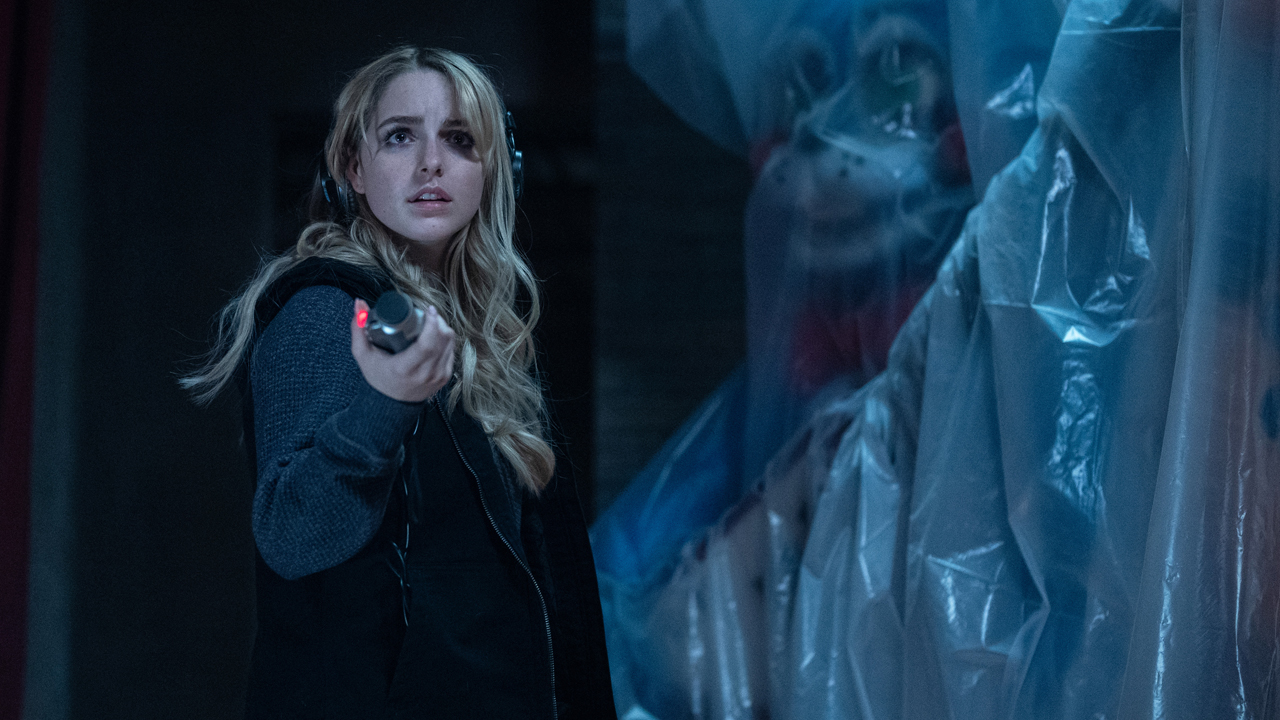Orlando Bloom Talks About His Return To Middle-Earth On The Set Of The Hobbit
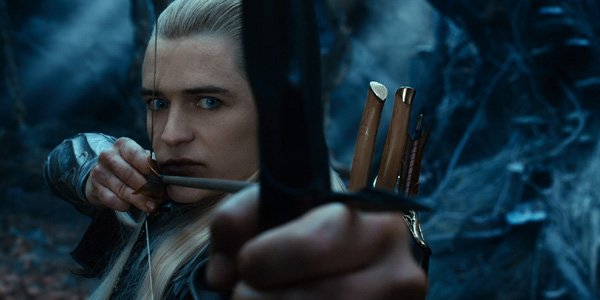
As a member of The Fellowship of the Ring, Orlando Bloom’s Legolas was one of the most important characters in Peter Jackson’s Lord of the Rings trilogy. The great Elf warrior from J.R.R. Tolkien’s novels truly came to life and gave the series some of its best moments, armed with some sweet archery skills and an unlikely friendship John Rhys-Davies’s Gimli. It’s a character that fans absolutely adore, and one that Bloom got the amazing chance to revisit on the set of The Hobbit trilogy.
As was revealed earlier today, my last report from the set of the new Hobbit movie was partially incomplete, as myself and a small group of other film journalists on the trip not only had the chance to see some scenes being filmed, but also talk with Orlando Bloom about his return to Middle-earth and the role of Legolas. You can read the complete interview below, in which the actor discusses working backwards from his performance in Lord of the Rings, working with the film’s revolutionary technologies, and the prince-versus-king dynamic that rises from his relationship with Lee Pace’s Thranduil.
Can you talk a little bit about getting back on set? What was your reaction to stepping back into this world the first day?
It was sheer joy. It was also a little bit of, "Oh, my word." This is ten years later, I'm ten years older and how's this all going to work? I quite literally was like, "Can I just try on my old costume just for posterity of it all?" It was amazing that Pete [Jackson] was back at the helm of this movie, and it was amazing that I got a call to say, “We would love you to be a part of the film.” I was just full of excitement. I was obviously like, "Ooh! This is going to be interesting to make the transition as an Elf being ten years older as myself, as an actor, going in to playing a character that would be younger, but as Elves are kind of ageless anyway we've managed to bridge the gap.
Is there much difference between Legolas in The Hobbit, versus Legolas in Lord Of The Rings?
No. Not masses. Essentially the Woodland Realm Elves, which is where Legolas is from, and my father being Thranduil, the king of those Elves, are a particular type of Elf as described by Tolkien to be... I'm not going to quote him correctly, but they are different from the Lothlorien and the Rivendell Elves. They're more militant, if you like. Legolas in Lord Of The Rings was sent as a bridge from his people into the world of dwarves and humans and wizards and everything else. This is an introduction into the Woodland Realm Elves. Obviously we meet my father, Thranduil, who is a very powerful and strong character who is very particular in his vision of who the Elves are, who the Woodland Elves are, specifically. They are kind of, like I said, a militant group, the Woodland Realm Elves. So I think that the opportunity that Pete and Philippa [Boyens] and Fran [Walsh]-- I think there was a desire for Legolas to come back. They felt that the fans would appreciate seeing Legolas in the Woodland Realm, and there was an opportunity to create a father-son, a prince versus king dynamic that would be interesting and serve the story.
Knowing how successful The Lord Of The Rings trilogy was, and also the fact that Legolas isn't actually in The Hobbit, was there ever any hesitation on your part about taking a role in this film?
Your Daily Blend of Entertainment News
Not after I had spoken to Peter. Their ideas, which I have explained, were made to clear to me about how it could be made seamless and effective. Not after I'd had that conversation. It was definitely something that anyone would think. There's a big love for these books and these films and these stories. I think in the hands of Peter, the fans, I would hope, would feel rest assured that he will deliver a movie that will both entertain and enjoy and will be in keeping with Tolkien's vision of the stories. They never stray at all from Tolkien's vision of what the world is, and for me it was exciting to think of returning to Middle Earth and to be a part of something. This is Pete in his element, doing what he does best. So it was just very exciting.
You guys pushed the boundaries of technology on the first three films, but on this one it seems, with 48 frames a second, the Red Epic 3D, but especially this slave motion cam, you guys are really pushing it a whole new generation forward. Can you talk about working with a slave motion cam and also your thoughts on this whole 48 frames a second?
I've never been a great one for technology. What I can tell you is that Pete is always going to push the boundaries and especially in a movie like this. The way that Pete explained to me really at the beginning of the movie was when he talked about it, and it slightly went over my head, but at the same time it was very simple. It was that shooting at 48 frames a second in 3D was going to make the experience for a movie-going audience much more pleasurable and natural and seamless, and make it all very much more real. In terms of an actor experiencing the slave moco aspect of it is interesting. It's very interesting. It is definitely new technology that can sometimes be challenging. But once you grasp what is required, from what I've seen it looks amazing. It looks incredible. A lot of what we did on Lord Of The Rings, what Pete did, it was just perspectives and shifting things. It was very rudimentary in comparison to what's being done today. In answer to your question, I'm as excited as you are, and I hope audiences will be to see how that all gels, and I know that it's something that Pete and his team will be doing, working extensively on to make it just the best experience that you can possibly have in the theatre.
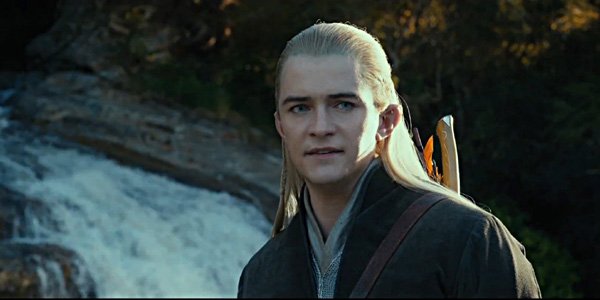
Could you just describe a little bit about slave motion camera, just in your words?
Essentially there's a green screen on one side of the studio with the dwarves. If I'm doing a scene with the dwarves, who would be probably at my waist height, there's a slave moco on one side where they're acting out and then I'd be on a set, or vice-versa, they could be on the set and I could be on the green screen slave moco, and the movements are mapped out and we will have done some kind of work leading up to that in rehearsal with doubles and with the actors, and then it all gets meshed into a computer and magically presented to you as two perfect worlds. I can't explain it any better than that, I'm so sorry. It's not my forte.
Does the playback when they put the two together help you though?
Yes. Absolutely, yeah for sure. At sometimes it's necessary to see and sometimes it isn't. It depends if... 'Cause you don't want to walk on top of somebody. Yeah.
I would imagine you would have to be very conscious of every little movement you make. Is it ever distracting, just on a technical acting level?
I have to say it isn't. Not at all. These cameras that they're using… We're doing handheld shots, we're doing over the shoulder shots, there's motion camera shots. When I did The Three Musketeers there were ginormous cameras to move around, but I think that was on film. This is digital and these Red Cameras, they're still somewhat bigger than the old film cameras, but they're managing to use them. They're small enough to be able to do everything that you would do with any other camera, and you don't act for a 3D camera, you act for a camera and the director creates shots that make that work. It doesn't change the process for me as an actor working in 3D or... No, it hasn't done it.
Because we know that Legolas and Gimli form this bond in Lord Of The Rings, does your dislike of dwarves in this, is it backwards acting to strengthen that bond by seeing how different he is?
Yes. This is a precursor and certainly you will understand where the rift has come from. Absolutely.
Do you return to your performance in Lord Of The Rings and play off yourself?
How do you mean, sorry?
Do you look at things that are locked in part of this universe and say, "If I act this way, given the full effect of watching all these movies, it'll mean something different."
Yeah, I don't over think what has happened. I'm taking really what has been presented in terms of the script and the story, and if it rings true to me and for the character, which it has done, 'cause as I said, the writers and Pete are very conscious of that, then I don't really have to over think it, because it was their intention to lay the groundwork that would play into a movie like Lord Of The Rings.
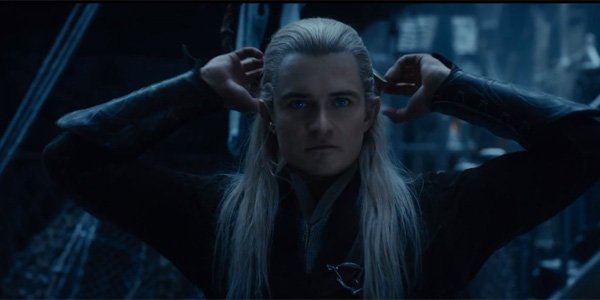
Did you have to retrain much for this? Is it all like getting on an old bike, and it just comes back?
No, I did. I came in early and it was a pleasurable thing to do. It's a really great character to be in the middle of. I got back in to some of the Elven movement things and the physicality of the character which is very different from… Ten years on your human body, how your human body behaves. And it was useful for me to go back and look at the Elven dialect and movement and to go back and do the archery and get my eye back in for all of those things. It was a really great enjoyable part of embracing the character again for this, so yeah.
Do you get the other actors, the newer actors in the cast come to you for insight or advice, being that you're one of the veterans of these films?
To be honest we've got some formidable actors on this movie, all of whom have actually been here a lot longer than I have in truth. They were shooting the dwarves and all of those things, that world was shooting a lot longer, so they were all much more comfortable with being on set and stuff. There's always that period before you ever go on to a movie where you just want to get one in the can, and once you got one in the can, then you're like, "Okay, I'm good to go." So I wouldn't say that's been the case, and it's also very different.
I have almost the exact opposite of that question. Have you had any scenes with some of the original cast members from the original trilogy, for example Ian McKellen, have you been working with him at all?
Not as yet. But I believe there are plans afoot, so yeah, but not as yet, no.
Any dwarf tossing like in the last trilogy?
There's some fun other dwarf moments coming up. I don’t want to give too much away, but there will be some fun interaction. It is different though, because as it was pointed out earlier, the relationship… the friendship that grew out of the relationship between Legolas and Gimli grew over a three movie period. I'm more seeing the dwarves as I would have seen them prior to going in to the Council of Elrond, which is full of disdain for what I, fundamentally as an Elf, believe their purpose is in life. There's not the same sort of thing, but there's definitely some jibes and moments that are good.
Even sillier question: have you seen The Avengers yet, and did you like the Legolas shout out in there? [Note: this interview took place in May 2012, just shortly after the release of The Avengers]
Oh, man, I have not seen it! I was going to see it last night, funnily enough. I didn't get to see it. There's a Legolas shout out? That's amazing. I really want to see it. I hear it's very, very good. It's amazing. Oh, that's cool, really? That's awesome. Good.
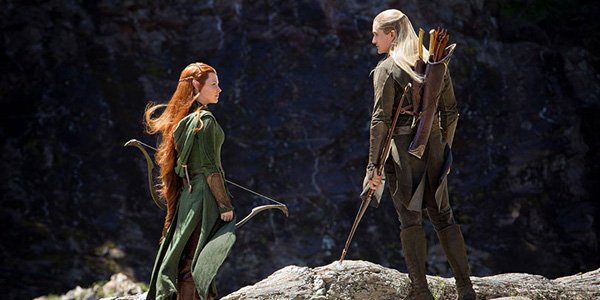
In the first three Lord Of The Rings films, I'm curious, how much changed on the set in terms of dialogue and script, and how is it compared to this film? Are you getting pages the night before that are changing, or is it pretty much been sticking?
Can I answer that question? Yes. Pages the night before is a very common occurrence.
Was it that way on the Lord of the Rings movies?
The way that Pete, Fran and Philippa work is specific to them, and yes, there was often script revisions right up until the last minute. It's a huge undertaking, a movie like The Lord Of The Rings, but also this movie, it's a huge undertaking. I think that things are always in flux, but we started with a script that has been evolving, if you like, and improving as we go kind of thing. That's their goal and that's why when there are script revisions, there can be script revisions right up before, but it's essentially the tenant of the scene is the same, it's just there are moments that are heightened or created and stuff, but yeah, there's definitely a lot of movement within the script to keep moving it forward, but I think it works for them and it works for the story and it's a huge undertaking, do you know what I mean, and I know that they take it very seriously. And their desire for it to be as good as it can be is what leads to there being revisions that continue on. That's the way I see it, and I think everyone else does, too.
Can you talk about the dynamic a bit between your character and his father, and how much of that do we actually get to see?
I can, somewhat reluctantly, because I think it's more interesting for people to see it. And when I say to you there is a certain rivalry-- a prince versus a king, a father versus a son, there's definitely a bit of father-son rivalry, prince-king rivalry that forwards the story, I don't really want to elaborate on it more than that, but it makes for a more interesting dynamic. Thranduil being the king of the Woodland Realm and, as I've said, those Elves being more of a militant group of Elves. Knowing that Legolas goes on to be a bridge, like an architect for peace between the Elves and the rest of the world, you might be able to guess there might be a little bit of me trying to understand more of what the plight of the rest of the world is and therefore somewhat coming up against odds with my father. Does that help?
The experience of making the movie is completely different. It could never be the same, because there was no expectation. That was a unique thing. This obviously, there is a heap of expectation. Actually the way that the movie is being filmed and shot it's really very similar to what the experience was on The Lord Of The Rings, outside of the key cast and stuff. There's a sort of creative chaos that breeds, I hope something really special that we saw on Lord Of The Rings. There's something about the way that the chaos that is created to make the movies that can lead, and we've seen it with Rings, and we hope to see it again. Something quite special and unique. It's unlike any other movie experience for sure. The way that it works, but I think it plays out very well to the advantage of the film and hopefully the audiences when they get to enjoy it.

Eric Eisenberg is the Assistant Managing Editor at CinemaBlend. After graduating Boston University and earning a bachelor’s degree in journalism, he took a part-time job as a staff writer for CinemaBlend, and after six months was offered the opportunity to move to Los Angeles and take on a newly created West Coast Editor position. Over a decade later, he's continuing to advance his interests and expertise. In addition to conducting filmmaker interviews and contributing to the news and feature content of the site, Eric also oversees the Movie Reviews section, writes the the weekend box office report (published Sundays), and is the site's resident Stephen King expert. He has two King-related columns.
